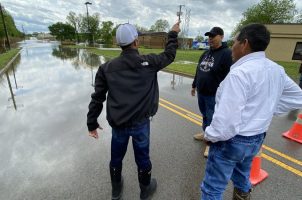Oklahoma Cherokee Casinos Temporarily Close Amid Frigid Temperatures
Posted on: February 17, 2021, 03:11h.
Last updated on: July 19, 2021, 03:14h.
As severe winter weather continues to grip the region, Oklahoma’s Cherokee Nation casinos will remain closed until Friday, according a television news report.

The state’s nine Cherokee casinos and Hard Rock Hotel and Casino in Tulsa were closed earlier in the week as ice storms and sub-zero temperatures paralyzed the region. Power outages have left more than 100,000 Oklahomans without electricity.
Under the original closure plan, the casinos were scheduled to reopen Wednesday. However, a midweek round of severe winter weather and power outages pushed the closures back until Friday at 1 pm, according to KOCO-TV. Cherokee Nation businesses and cultural sites also are closed.
On Wednesday, the Hard Rock website stated, “Hard Rock Tulsa Closed to Conserve Resources for Area Residents.”
If the severe weather and utility outages continue, the closures could extend beyond the scheduled date and time. Forecasters are predicting a return next week to seasonal temperatures.
Chuck Garrett, CEO of Cherokee Nation Businesses, said authorities are assessing conditions “to ensure the safety and well-being of the communities we call home.”
Employees normally scheduled to work during the closures will be paid for their shifts, officials said.
Rolling Power Outages
As least 24 people have died in the bitter cold weather sweeping over much of the nation this week, according to the Associated Press. More than 100 million people live in places that experienced weather watches and warnings.
In Northwest Arkansas near the Oklahoma border, residents this week faced record-breaking cold temperatures of minus 19 degrees. Other parts of the country encountered similar temperatures or worse.
Across the nation, almost 3.4 million utility customers were without power on Wednesday. In states from Minnesota to Texas, utility customers experienced rolling blackouts lasting an hour or longer, as power companies struggled to keep up with overwhelming demand. In some places, customers who still had power were advised to conserve electric energy.
Oklahoma Gas & Electric asked customers to set thermostats at 68 degrees Fahrenheit, the Associated Press reported. Customers also were urged not to use major electric appliances and to turn off lights or appliances not in use.
In Texas, 2.7 million households were without power Tuesday night.
There’s really no letup to some of the misery people are feeling across that area,” said Bob Oravec, lead forecaster with the National Weather Service.
According to the Associated Press, these bitter cold temperatures are the result of a weather pattern called the polar vortex. This pattern normally remains in the Arctic, but increasingly has plunged into lower latitudes. Global warming caused by humans is partly responsible, the Associated Press reported.
Gulf Coast Feels Impact
The icy temperatures and hazardous conditions reached as far south as Louisiana and Mississippi.
That region along the Gulf Coast months earlier endured a devastating hurricane season that killed dozens of people and destroyed numerous business and homes.
During the summer and fall, several casinos along the Gulf Coast were closed temporarily, as hurricanes and tropical storms roared ashore. In Mississippi, hurricane-related winds and storm surges battered casinos on the Gulf Coast. Of the 26 commercial casinos in Mississippi, eight are along the coast in the Biloxi area.
One of the worst-hit regions during the storm season was Southwestern Louisiana, where two major hurricanes shredded the Lake Charles area. The three riverboat casinos in that region were damaged in hurricane winds. A race track just west of Lake Charles near the Texas border also received damage.
This year’s record-breaking hurricane season officially ended in November.
Related News Articles
Most Popular
LOST VEGAS: ‘Tony The Ant’ Spilotro’s Circus Circus Gift Shop
Las Vegas Overstated F1 Race’s Vegas Impact — Report
Mega Millions Reportedly Mulling Substantial Ticket Price Increase
Las Vegas Strip Stabbing Near The Strat Leaves One Man Dead
Most Commented
-
End of the Line for Las Vegas Monorail
— April 5, 2024 — 90 Comments -
Mega Millions Reportedly Mulling Substantial Ticket Price Increase
— April 16, 2024 — 8 Comments -
Long Island Casino Opponents Love New York Licensing Delays
— March 27, 2024 — 5 Comments -
Smart Video Poker Players Hamper Casino Profits, Says Study
— March 21, 2024 — 4 Comments
















No comments yet